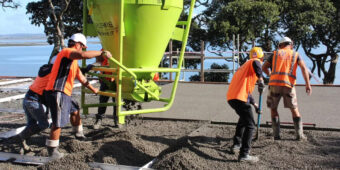The game changer – injuries at work
06 Jul 2013, Community & Sponsorship

Imagine you’re the top try scorer for defending Investec Super Rugby Champions the Chiefs and you discover you have a bleeding ulcer; the All Black camp is only one week away. Now you will never know if you were going to be called into it.
You have just spent eight months rehabilitating. In your first few games back, you are playing great footy but because of one tackle in training you are now back on the operating table.
You are the top point scorer in the Investec Super Rugby competition and a scan reveals you have broken a bone in your foot the day of a match and now you are out for six weeks.
Tim Nanai-Williams, Richard Kahui and Gareth Anscombe are just three Chiefs players who have had been struck down by injury. They join a big list of Super Rugby players spending time on the sidelines and taking part in intensive rehabilitation programs.
“Injuries are a frustrating part of our job,” says builder and Chiefs midfielder Richard Kahui. “In one game, your whole life can be turned upside down. Believe me, I know – it has happened to me five times.
Support network
“Staying in the team environment and being involved with the boys is really important to keeping you sane. It is important to have a good support network around you and keep yourself busy.”
“Injuries can be a game changer and, as in every industry, the Chiefs try to minimise the risks
Each Super Rugby team has its own medical staff and this year they have been kept busier than ever. It is no secret that this is one of the toughest competitions in the world. You only have to see the intensity, massive hits and high work rate to see why.
If a team comes through a match without any injuries, it is a celebrated occasion. But what happens to these injured players out of the public eye?
Stuck On the sidelines
While following a strict recovery programme under the surveillance of the medical staff and trainers, the players remain an important part of the team environment. They are required to help with analysis work on the opposition each week and help the team prepare their game plan for the upcoming match. They also have an increase in the amount of the community engagement work.
On match day, injured players spend time in the kids’ ‘Fan Zone’, hand out flags to the supporters or spend time in the sponsors lounge before joining the rest of us watching the game nervously – something they all struggle with, as they constantly yell at their team mates on the field during the game.
Hard to watch
“It is definitely harder to watch than to play,” says Gareth Anscombe. “It is more stressful on the sidelines; I don’t know how the coaches do it.”
“Training definitely becomes a bit tougher as you don’t have the game as the goal for the end of the week.”
Injuries can be a game changer and, as in every industry, the Chiefs try to minimise the risks. But, as Chiefs coach Dave Rennie says: “It is just part of the sport and we have confidence that the next player in line will do a good job.”
For information on the Chiefs visit www.chiefs.co.nz or follow on facebook.com/Chiefs Rugby or via twitter @ChiefsRugby
Register to earn LBP Points Sign in



